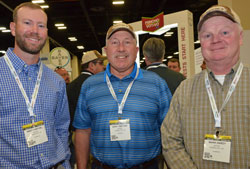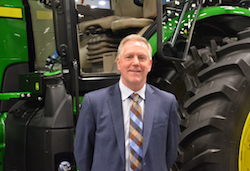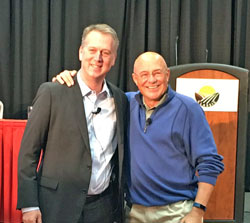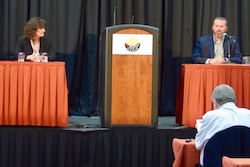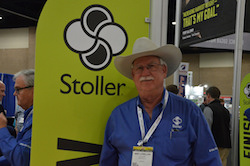 Mike Lewallen is a sales and marketing development representative for Stoller USA who attended Commodity Classic to tell growers about the advantages of using hormones to improve yields. Twenty-five years ago Stoller discovered nutrition alone wasn’t enough to bring out the high-end yields they were looking for, so the company began to create formulations that encourage growth at the from the Start of planting, through the Growth stage and then to Finish strong.
Mike Lewallen is a sales and marketing development representative for Stoller USA who attended Commodity Classic to tell growers about the advantages of using hormones to improve yields. Twenty-five years ago Stoller discovered nutrition alone wasn’t enough to bring out the high-end yields they were looking for, so the company began to create formulations that encourage growth at the from the Start of planting, through the Growth stage and then to Finish strong.
“We feel like in any cropping system if you start your plant off growing properly, because that’s where your first loss of yield incurs is at germination, so if we can overcome and start that plant off better, then we’ve got a better chance of making more yield or prevent yield loss in the growth stage of the plant,” Lewallen said as he described their Start, Grow, Finish program.
Listen to my full interview with Lewallen to learn more about how hormones can help a crop: [wpaudio url=”http://traffic.libsyn.com/zimmcomm/cc-17-lewallen.mp3″ text=”Interview with Mike Lewallen”]
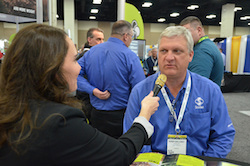 Perry Galloway is a grower from Arkansas who can testify to the effectiveness of the Stoller products with amazing yields like 108 bushel soybeans in 2015. “I’m fortunate enough to have held several yield titles in corn, soybeans, wheat and grain sorghum, and Stoller was involved in all of those– the Start, Grow, Finish program or at least major parts,” Galloway says.
Perry Galloway is a grower from Arkansas who can testify to the effectiveness of the Stoller products with amazing yields like 108 bushel soybeans in 2015. “I’m fortunate enough to have held several yield titles in corn, soybeans, wheat and grain sorghum, and Stoller was involved in all of those– the Start, Grow, Finish program or at least major parts,” Galloway says.
Galloway says he Starts strong with seed treatments or in-furrow treatments for cell enlargement and perfect plant hormone balance. During the Grow season he adds BioForge to eliminate plant stress and other products to stimulate hormones and fertility, as well as cell division. To Finish strong Galloway applies a sugar mover product to increase test weight on his corn and soybeans. The program is clearly working well, as his records show.
To learn more about Galloway’s Grow, Start, Finish program listen to my full interview with him here: [wpaudio url=”http://traffic.libsyn.com/zimmcomm/cc-17-galloway.mp3″ text=”Interview with Perry Galloway”]
2017 Commodity Classic Photo Album
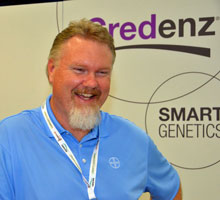 Monty Malone was in San Antonio for Commodity Classic to talk to growers about the latest in Credenz soybeans. Last year more than 500 trials in 6 states showed that, when compared head-to-head, Credenz LibertyLink soybeans offered a 2.2 bu/A yield advantage over Asgrow Roundup Ready 2 Xtend beans. Next year the company is going even bigger with 10 new varieties of smart genetics soybeans, and 2018 promising even more.
Monty Malone was in San Antonio for Commodity Classic to talk to growers about the latest in Credenz soybeans. Last year more than 500 trials in 6 states showed that, when compared head-to-head, Credenz LibertyLink soybeans offered a 2.2 bu/A yield advantage over Asgrow Roundup Ready 2 Xtend beans. Next year the company is going even bigger with 10 new varieties of smart genetics soybeans, and 2018 promising even more.



